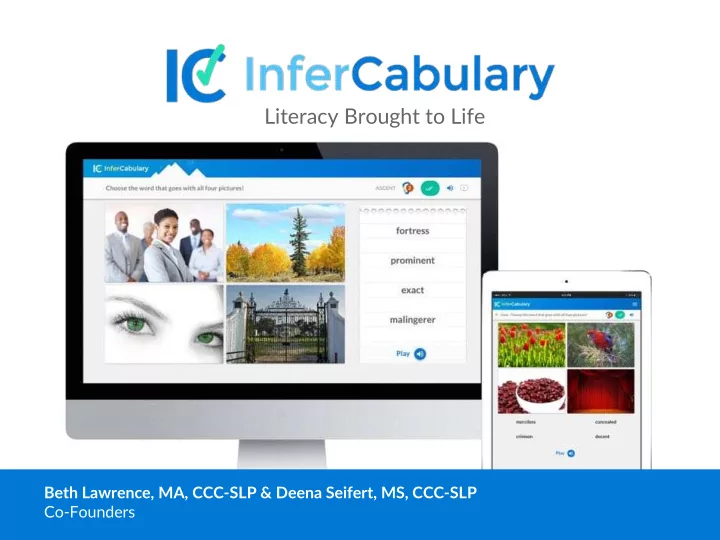

Literacy Brought to Life Beth Lawrence, MA, CCC-SLP & Deena Seifert, MS, CCC-SLP Co-Founders
Why Focus on Vocabulary? When students struggle with vocabulary it impacts all learning. Vocabulary is the key building block for reading comprehension. Students must understand 95% - 98% of the words in a given text to independently comprehend that text. Hu & Nation, 2000 Students who enter school with low vocabulary rarely catch up. Low socioeconomic status and learning disabilities can limit a student’s vocabulary; and that gap widens through the school years. Loftus et al., 2010
Current Teaching Methods Rely heavily on language. Current methods use language to teach language to students who struggle with language. Even for more proficient students, definitions often include advanced words that challenge, rather than teach. Prioritize rote memorization over critical thinking. Exercises, such as memorizing definitions or using the word in a sentence, fail to promote authentic learning.
Typical Dictionary Definition prudent [prood-nt] adjective Wise or judicious in practical affairs; sagacious; discreet or circumspect; sober Process: Rote memorization of 11 th grade words in definition to “learn” a 6 th grade word Result: Students forget definition after test 4
Current Approaches Fail 35 million students struggle with language and vocabulary, negatively impacting all learning. Ineffective for Students: • Using language to teach language doesn’t work. • Rote memorization ≠ actual learning. Expensive for Schools: • Vocabulary instruction dollars are disproportionately spent on expensive in-person instruction for special education/English Language instruction. • Quality instruction for regular education is time-intensive.
Two Ways of Measuring Vocabulary semantic representations for each known word (predicts comprehension) (Walley, Metsala, & Garlock, 2003) number of lexical entries (predicts decoding) (Ouellette & Beers, 2010) 6
Two Phases of Vocabulary Development Fast Mapping Extended Mapping (Breadth) (Depth) A child’s ability to learn a new word or concept with minimal exposure to it 7
Infer Cabulary 8
Teacher Differentiation InferCabulary.com Instructors assign words by: • Grade level • Category label • Title of novel being taught Teachers monitor progress with Reports 9
Independent Research Raw score 110 105 100 InferCabulary Traditional 95 Traditional InferCabulary Methods 90 85 80 Week 1 Week 2 Week 3 Week 4 Week 5 Week 6 University of Virginia’s Dr. Michael Kennedy conducted a 6-week study with 75 regular education fifth- • grade students. Results “statistically significant.” Research is in review for publication in peer-reviewed journal. 6.5 to 19% higher quiz scores. Additional studies planned with Vanderbilt, and Universities of Maryland, Virginia & Rhode Island • 10
Teacher Questions in 20 Minute Blocks 100" 90" 80" 70" 60" Tradi4onal" 50" InferCabulary" 40" 30" 20" 10" 0" Week"1" Week"2" Week"3" Week"4" Week"5" Week"6" 11
Evidence & Anecdotes From A Maryland School 10/11 th Grade English • Prior to InferCabulary, 29% regularly failed quizzes. • The first week of InferCabulary, students reported enjoying learning the words • 100% received ≥ 80% on quiz items that required them to apply understanding to novel contexts • 86% received a score of 90% or above. Computer Lab • students regularly ask to play InferCabulary when given a choice 12
ERB Assessment Vocabulary Scores 4 th then 5 th Grade 9 8 7 6 5 2016 Stanine 4 2017 Stanine 3 2 1 0 Student Student Student Student Student Student Student Student 1 2 3 4 5 6 7 8 Independent School English class for students identified with language-learning needs Student 7 transferred, no data available on Student 8 13
InferCabulary Activity 14
Literacy Brought to Life Copies of this presentation, handouts, and research https://InferCabulary.com Deena Seifert, M.S., CCC-SLP deena@infercabulary.com Beth Lawrence, M.A., CCC-SLP beth@infercabulary.com 15
16
Recommend
More recommend